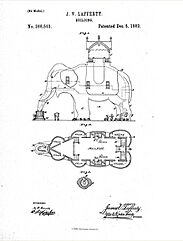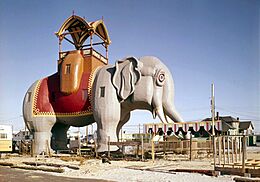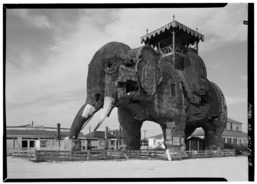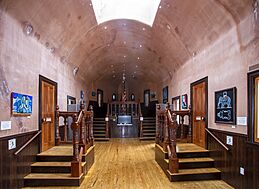Lucy the Elephant facts for kids
|
Lucy, the Margate Elephant
|
|
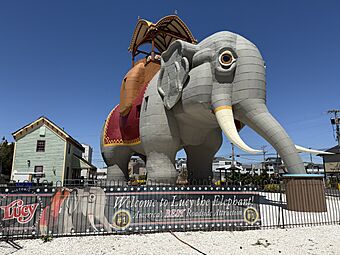
Lucy in 2025
|
|
| Location | 9200 Atlantic Ave Margate City, New Jersey |
|---|---|
| Built | 1882 |
| Architect | James V. Lafferty |
| NRHP reference No. | 71000493 |
Quick facts for kids Significant dates |
|
| Added to NRHP | August 12, 1971 |
| Designated NHL | May 11, 1976 |
Lucy the Elephant is a giant, six-story building shaped like an elephant. It was built in 1882 by James V. Lafferty in Margate City, New Jersey. Lucy was created to help sell land and attract visitors to the area.
Today, Lucy is the oldest surviving roadside attraction in America. She is a famous landmark and a fun place to visit.
Contents
Lucy's Story
Building a Giant Elephant
The Idea and Construction
On December 5, 1882, James V. Lafferty received a special patent. This patent gave him the right to build and sell "animal-shaped buildings" for 17 years. Lafferty used this idea to build Lucy.
He hired architects William Free and J. Mason Kirby to design the elephant. Lucy was inspired by Jumbo, a very famous elephant from Barnum and Bailey's Greatest Show on Earth. Building Lucy cost between $25,000 and $38,000.
Lucy's Size and Materials
Lucy was first called "Elephant Bazaar." She stands 65 feet (19.7 meters) tall, 60 feet (18.3 meters) long, and 18 feet (5.5 meters) wide. She weighs about 90 tons! This makes her the 12th tallest statue in the United States.
Lucy was made from nearly one million pieces of wood. Workers used 200 kegs of nails and 4 tons of bolts and iron bars. Her outside is covered with 12,000 square feet of tin. There are 22 windows all over her body.
What Lucy Was Used For
Originally, Lafferty used Lucy to show people land for sale. From Lucy's howdah (a carriage on her back), customers could see great views. They could look at Margate, the Atlantic City skyline, the beach, and the Atlantic Ocean.
Today, visitors can still go up to the howdah. It's a perfect observation deck during tours.
A New Owner and Name
In 1887, Anton Gertzen bought Lucy. His family owned her until 1970. Anton's daughter-in-law, Sophia Gertzen, gave the elephant her famous name, "Lucy the Elephant," in 1902.
Lucy's head looks like an Asian elephant. Only male Asian elephants have tusks. At first, people thought Lucy was a male. But over time, she became known as a female.
Lucy Through the Years
Different Jobs for Lucy
For the first half of the 1900s, Lucy had many different jobs. She was a restaurant, a business office, and even a small home. She was also a place to eat and drink, though that closed during Prohibition.
Lucy appeared on many souvenir postcards. People often called her "The Elephant Hotel of Atlantic City." (The actual hotel was in a building nearby, not inside Lucy herself.)
Saving Lucy
By the 1960s, Lucy was in bad shape. She was going to be torn down. In 1969, Edwin T. Carpenter and others started a group called the Margate Civic Association. Later, it became the Save Lucy Committee.
This group, led by Josephine Harron and Sylvia Carpenter, had 30 days to move Lucy or pay for her demolition. They held many events to raise money. Volunteers even went door-to-door to collect donations. Their hard work saved Lucy!
Lucy's Big Move and Restoration
On July 20, 1970, Lucy was moved to a new spot. This city-owned lot was about 100 yards away. The move took about seven hours. Lucy was then closed for repairs until 1974.
During the restoration, new steel was added to support Lucy's original wooden frame. The howdah was also replaced. A special green glass plug was put into the howdah floor. This helps light up Lucy's inside.
In 1971, Lucy was added to the New Jersey Register of Historic Places and the National Register of Historic Places. In 1976, she was named a National Historic Landmark. This happened during the United States Bicentennial celebration.
Lucy Today
Every year on July 20, Lucy's birthday is celebrated. It's a fun event with games for children and lots of excitement.
In 2006, lightning struck Lucy, making the tips of her tusks black. In October 2012, Hurricane Sandy hit near Margate. Lucy was not harmed, even though the water reached her "toes."
In 2016, Lucy's staff jokingly announced she was running for President of the United States. This was part of her 135th birthday party. That year, 135,000 people visited Lucy, and 35,000 took a guided tour.
In February 2020, Lucy started allowing people to stay overnight. She was listed on Airbnb for a few nights in March 2020. This was the first time anyone had lived inside Lucy since the early 1900s.
Recent Renovations and Future Plans
In August 2021, the Save Lucy Committee announced a big plan. They would repair and replace Lucy's metal skin. They received a $500,000 grant from the National Park Service. An inspection in 2021 showed that more than half of Lucy's metal skin was too old to fix.
The project also got money from the Preserve New Jersey Preservation Fund. Lucy closed on September 20, 2021, for these repairs. After some delays, she reopened on December 28, 2022. The total cost for this restoration was $2.4 million.
On January 5, 2023, Margate City approved a plan for a new visitor's center at Lucy's site. This two-story building will have a gift shop, information displays, meeting rooms, and restrooms. It will be built where the old gift shop was.
In 2023, Lucy had a record number of visitors, with 42,267 tours given. This was more than ever before.
In May 2025, Lucy was voted the No. 1 Best Roadside Attraction in the country by USA Today readers.
Other Elephant Buildings
Elephantine Colossus
The Elephantine Colossus was also known as the Elephant Hotel. It was built in Coney Island, New York. This elephant was 122 feet (37.2 meters) tall, about twice Lucy's size. It had seven floors of rooms.
Its legs were 60 feet around. One leg held a cigar store, and another had a diorama. Hotel rooms were inside the elephant's body. There was an observation area at the top with ocean views. Sadly, it burned down in 1896.
Light of Asia
Light of Asia opened in Cape May, New Jersey in 1884. Locals called it Old Jumbo. It was a bit smaller than Lucy. This elephant building was not as successful and was torn down within 16 years.
A Grand Plan for Chicago
In 1892, a plan was made for a fourth elephant building. This one would have been even bigger than the Elephantine Colossus. It was designed to have a moving trunk, eyeballs, ears, and tail. It would also have a musical instrument called a Calliope in its throat. This giant elephant was planned for the 1893 World's Columbian Exposition in Chicago. However, it was never actually built.
See also
- Cultural depictions of elephants
- Elephant of the Bastille
- Charles Ribart and his plan for the site of L'Arc de Triomphe
- National Register of Historic Places listings in Atlantic County, New Jersey
- Tillie, another colorful icon of the Jersey Shore


